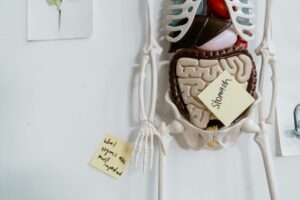Introduction:
Anxiety is a pervasive and challenging condition that affects millions of people worldwide. While conventional treatments often rely on medications with potential side effects, many individuals are turning to alternative approaches like homeopathy for a holistic and natural solution. In this blog, we will explore six powerful ways homeopathy can be used to effectively treat anxiety, addressing the root causes and promoting emotional well-being.
1. Ignatia Amara:
Ignatia Amara is considered an effective homeopathic remedy for treating anxiety, particularly when the anxiety is linked to grief, loss, or sudden emotional shocks. Here are several reasons why Ignatia Amara is often chosen in homeopathic practice for individuals experiencing anxiety:
- Grief and Emotional Distress:
- Ignatia Amara is especially well-suited for individuals who are experiencing intense grief or emotional distress. This remedy is often indicated when there is a recent loss, such as the death of a loved one or the end of a significant relationship. The emotional turmoil associated with grief can manifest as anxiety, and Ignatia aims to address these deep emotional wounds.
- Mood Swings:
- Individuals who may benefit from Ignatia often exhibit pronounced mood swings. They may alternate between laughter and tears, feeling sad and then suddenly cheering up. Ignatia is chosen when there is a rapid and sudden change in emotional states, reflecting the emotional ups and downs associated with grief and loss.
- Suppression of Emotions:
- People who require Ignatia may have a tendency to suppress their emotions, particularly in social situations. They may put on a brave face but harbor inner feelings of sorrow or disappointment. Ignatia helps in releasing these suppressed emotions and allows for a more natural expression of grief and sadness.
- Sighing and Emotional Release:
- Ignatia is often associated with a tendency to sigh frequently. Sighing is considered a physical manifestation of emotional tension or suppression, and Ignatia helps in facilitating emotional release. By addressing the physical and emotional aspects of anxiety, Ignatia aims to bring about a sense of relief.
- Overstimulation of Nervous System:
- Ignatia is suitable for individuals whose nervous system becomes overstimulated due to emotional shocks or grief. This overstimulation can manifest as restlessness, nervousness, and a sense of unease. Ignatia works to soothe the nervous system and restore a sense of calmness.
- Individualized Treatment:
- Homeopathy is based on the principle of “like cures like,” where a substance that can produce symptoms in a healthy person is used to treat similar symptoms in an individual who is unwell. Ignatia, derived from the St. Ignatius bean, is well-matched to the specific emotional and physical symptoms associated with grief-induced anxiety.
2. Aconitum Napellus:
Aconitum Napellus, commonly known as Aconite, is considered an effective homeopathic remedy for treating anxiety, particularly when anxiety comes on suddenly and intensely. Several key characteristics make Aconitum Napellus a suitable choice for individuals experiencing acute anxiety:
- Sudden Onset:
- Aconitum is well-indicated when anxiety symptoms appear suddenly and are often associated with a recent shock, fright, or traumatic event. It is especially beneficial for anxiety that arises unexpectedly, and the person may feel overwhelmed by fear or panic.
- Intense Fear and Apprehension:
- Individuals who may benefit from Aconitum often experience intense fear and apprehension. This fear can be accompanied by a sense of impending doom, restlessness, and a feeling of being unable to escape the situation causing anxiety.
- Restlessness and Agitation:
- Restlessness is a prominent feature of Aconitum. People in need of this remedy may feel restless and agitated, both mentally and physically. There may be a constant need to move, an inability to sit still, and a sense of urgency.
- Physical Symptoms Alongside Anxiety:
- Aconitum is often chosen when anxiety is accompanied by physical symptoms such as a racing heart, palpitations, and shortness of breath. The anxiety may manifest in the form of a panic attack with heightened physical sensations.
- Symptoms Worsened at Night:
- Anxiety symptoms in individuals requiring Aconitum may be more pronounced at night. Insomnia or sleep disturbances can be part of the overall picture, and the person may experience heightened anxiety during the evening or when trying to sleep.
- Fever and Chills:
- In addition to anxiety symptoms, Aconitum is often indicated when there are feverish symptoms with a sudden onset, especially if anxiety is triggered by exposure to cold winds or drafts.
- In addition to anxiety symptoms, Aconitum is often indicated when there are feverish symptoms with a sudden onset, especially if anxiety is triggered by exposure to cold winds or drafts.
3. Argentum Nitricum:
Argentum Nitricum, commonly known as Arg. Nit., is considered effective in treating anxiety through homeopathy due to its specific properties and the way it addresses certain aspects of anxiety symptoms. Here are some reasons why Argentum Nitricum is often recommended for anxiety:
- Anticipatory Anxiety:
- One of the key indications for Argentum Nitricum is anticipatory anxiety. Individuals who may benefit from this remedy often experience intense anxiety and nervousness leading up to a specific event or situation. This could include performance anxiety, fear of heights, or fear of flying. Argentum Nitricum is particularly well-suited for anxiety that is tied to anticipation.
- Worry and Apprehension:
- Those who require Argentum Nitricum often exhibit excessive worry and apprehension, especially about the future. The anxiety is not just general; it is specific to upcoming events or situations. This remedy is suitable for individuals who may imagine worst-case scenarios and become excessively nervous about what might happen.
- Physical Symptoms Accompanying Anxiety:
- Argentum Nitricum is known for addressing not only the mental and emotional aspects of anxiety but also the physical symptoms that often accompany it. These may include digestive issues like bloating, belching, and diarrhea. The connection between mental and physical symptoms is a key consideration in homeopathy, and Argentum Nitricum addresses both aspects.
- Restlessness and Impulsivity:
- Individuals who might benefit from Argentum Nitricum often experience restlessness and may exhibit impulsive behavior. This can manifest as a desire to pace, fidget, or constantly move in an attempt to release the nervous energy associated with anxiety.
- Fear of Heights and Open Spaces:
- This remedy is especially useful for addressing anxiety related to heights and open spaces. Individuals who fear tall buildings, bridges, or any situation where they might feel trapped may find relief with Argentum Nitricum.
- Relief from Talking:
- Argentum Nitricum individuals often find relief from their anxiety through talking. Expressing their fears and concerns to someone can have a calming effect on them. This characteristic is considered in the selection of this remedy for those who benefit from verbalizing their anxieties.
4. Gelsemium Sempervirens:
Gelsemium Sempervirens, commonly known as Gelsemium, is considered effective in treating anxiety through homeopathy based on its specific properties and the characteristic symptoms it addresses. Here are several reasons why Gelsemium is often chosen as a homeopathic remedy for anxiety:
- Gradual Onset of Anxiety:
- Gelsemium is typically indicated for individuals who experience a slow, gradual onset of anxiety. The anxiety may build up over time, leading to a state of nervous anticipation. This makes Gelsemium well-suited for cases where anxiety is not sudden or acute but develops over a period.
- Physical Weakness and Heaviness:
- One of the distinguishing features of Gelsemium-related anxiety is the presence of physical weakness and a sensation of heaviness. Individuals requiring Gelsemium may feel trembling, lethargic, and have a heaviness in the limbs. This physical component sets it apart from other remedies and guides its selection.
- Trembling and Shaking:
- Gelsemium is known for addressing anxiety accompanied by trembling and shaking. The trembling may be noticeable in various parts of the body, such as the hands or legs. This physical manifestation of anxiety is a key characteristic that points to the potential use of Gelsemium.
- Fear of the Unknown or Anticipation Anxiety:
- Gelsemium is particularly suitable for anxiety related to anticipation, such as before a performance, an exam, or any event with an uncertain outcome. Individuals who benefit from Gelsemium may experience a sense of apprehension, nervousness, and fear linked to upcoming situations.
- Dullness and Dizziness:
- Another characteristic symptom that aligns with Gelsemium is a state of mental dullness and dizziness. People requiring Gelsemium may feel mentally dull, drowsy, and may have difficulty concentrating. This mental state is often accompanied by a sense of lightheadedness or dizziness.
- Relief from Consolation:
- Gelsemium individuals may seek consolation and support when anxious. They may feel better when reassured or when in the company of someone comforting. This need for support and consolation is considered when prescribing Gelsemium for anxiety.
- Flu-Like Symptoms:
- In addition to anxiety, Gelsemium is known to address symptoms resembling those of a flu, such as weakness, aching muscles, and a heavy head. If an individual experiences a combination of anxiety and these flu-like symptoms, Gelsemium may be considered.
5. Lycopodium Clavatum:
Lycopodium clavatum, commonly known as Lycopodium, is considered an effective homeopathic remedy for anxiety due to its specific characteristics and the range of symptoms it addresses. Here are several reasons why Lycopodium is often recommended in homeopathic treatment for anxiety:
- Lack of Confidence and Fear of Failure:
- Lycopodium is particularly well-suited for individuals who struggle with a lack of self-confidence and fear of failure. People needing Lycopodium may experience anxiety, especially in situations where they feel they may be judged or evaluated negatively.
- Performance Anxiety:
- This remedy is often indicated for anxiety related to performance, such as public speaking, examinations, or other situations where an individual is required to showcase their abilities. Lycopodium may help alleviate the nervousness, trembling, and fear associated with such events.
- Digestive Issues:
- Individuals requiring Lycopodium for anxiety often present with concomitant digestive issues. Bloating, gas, and discomfort in the abdominal region are common symptoms. The integration of physical symptoms into the overall picture of anxiety is a characteristic consideration in homeopathic prescribing.
- Fear of Social Situations:
- Lycopodium is beneficial for individuals who experience anxiety in social situations, particularly when they perceive themselves to be in a subordinate position. Fear of criticism and a tendency to avoid confrontations or social interactions are key aspects that align with the remedy.
- Worse from Anticipation:
- Anxiety in individuals needing Lycopodium is often heightened by anticipation. Whether it’s the anticipation of an upcoming event, social interaction, or performance, the anxiety tends to intensify beforehand. This characteristic is crucial in determining the suitability of Lycopodium for a particular individual.
- Right-Sided Symptoms:
- Lycopodium is known for its preference for affecting the right side of the body. In the context of anxiety, this may manifest as right-sided headaches, right-sided digestive discomfort, or other symptoms that are more pronounced on the right side.
- Emotional and Mental Aspects:
- Homeopathy considers the emotional and mental state of an individual in addition to physical symptoms. Lycopodium addresses both the emotional and mental aspects of anxiety, aiming to restore balance and confidence. The remedy is chosen based on the totality of symptoms and the unique characteristics of the individual.
6. Natrum Muriaticum:
Natrum Muriaticum, commonly known as Natrum Mur, is considered an effective homeopathic remedy for anxiety based on its specific properties and the symptoms it is known to address. Here are some reasons why Natrum Muriaticum is often recommended in homeopathic treatment for anxiety:
- Suppressed Emotions:
- Natrum Muriaticum is particularly well-suited for individuals who tend to suppress their emotions, especially grief and sadness. People who need this remedy may have experienced emotional traumas or losses and struggle to express their feelings openly. Anxiety in such individuals may arise from unaddressed emotional issues.
- Isolation and Reserved Nature:
- Individuals requiring Natrum Mur often exhibit a reserved and closed nature. They may prefer to deal with their emotions in private and may find it challenging to open up to others. This tendency towards isolation and emotional restraint can contribute to anxiety, and Natrum Mur aims to address these underlying emotional patterns.
- Fear of Rejection:
- The fear of rejection or emotional vulnerability is a common theme in individuals who benefit from Natrum Muriaticum. Anxiety may be heightened in situations where there is a perceived risk of being hurt emotionally or rejected. This fear can impact relationships and social interactions, leading to increased anxiety.
- Headache and Fatigue:
- Physical symptoms such as headaches and fatigue often accompany the anxiety in individuals who may benefit from Natrum Mur. These symptoms may be exacerbated by emotional stress and are considered part of the overall picture that guides the selection of this remedy.
- Worsening from Sunlight:
- Natrum Mur is known to have an aversion to sunlight. Individuals who experience increased anxiety or worsening of symptoms in bright sunlight may find relief from Natrum Muriaticum. This sensitivity to sunlight is considered a characteristic symptom when determining the appropriateness of this remedy.
- Craving for Salt:
- Another characteristic of those who may benefit from Natrum Mur is a craving for salt. The craving for salty foods can be an important indicator for selecting this remedy. It is believed that addressing this specific physical symptom can contribute to the overall balance in the individual.






